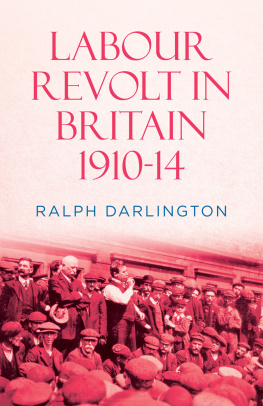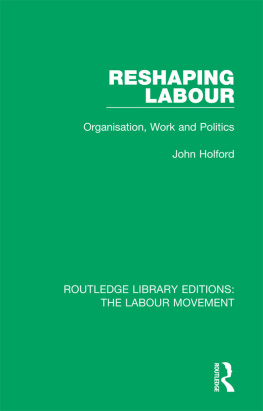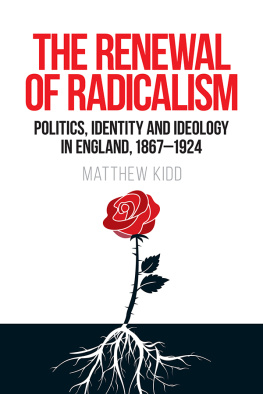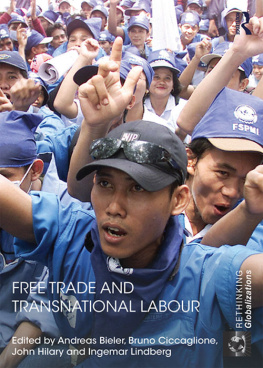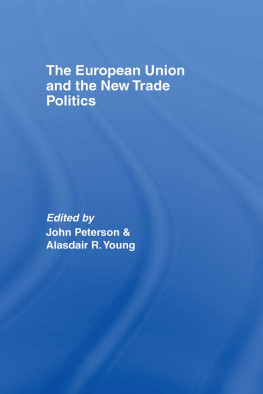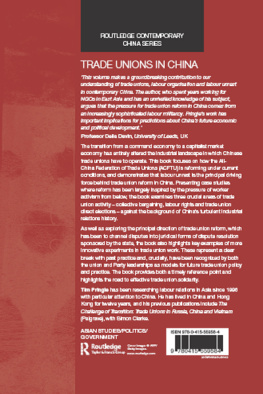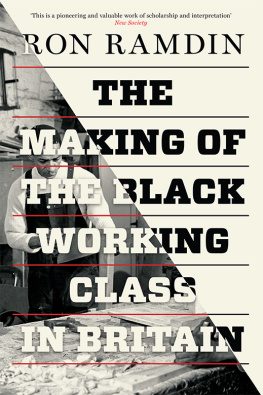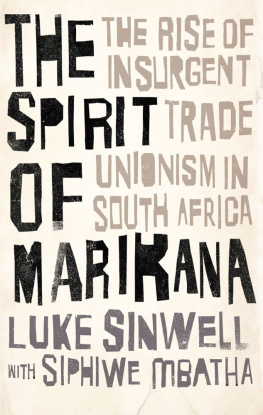RESPECTABLE RADICALS
In memory of Steve Sullivan, Trade Unionist and Socialist 1956-1997
Respectable Radicals
Studies in the politics of railway trade unionism
David Howell
First published 1999 by Ashgate Publishing
Published 2016 by Routledge
2 Park Square, Milton Park, Abingdon, Oxon OX14 4RN
711 Third Avenue, New York, NY 10017, USA
Routledge is an imprint of the Taylor & Francis Group, an informa business
Copyright David Howell, 1999
The author has asserted his right under the Copyright, Designs and Patents Act, 1988, to be identified as the Author of this work.
All rights reserved. No part of this book may be reprinted or reproduced or utilised in any form or by any electronic, mechanical, or other means, now known or hereafter invented, including photocopying and recording, or in any information storage or retrieval system, without permission in writing from the publishers.
Notice:
Product or corporate names may be trademarks or registered trademarks, and are used only for identification and explanation without intent to infringe.
British Library Cataloguing-in-Publication Data
Howell, David
Respectable Radicals: Studies in the Politics of Railway Trade
Unionism.
1. National Union of Railwaymen History. 2. Trade unions Political
activity. 3. Trade unions Government policy Great Britain. I. Title
331.8'811'385'0941
US Library of Congress Cataloging-in Publication Data
Howell, David
Respectable Radicals: Studies in the Politics of Railway Trade
Unionism / David Howell
p. cm. Includes bibliographical references.
1. Trade Unions Railroads Great Britain History. 2. Trade
unions Railroads Great Britain Political activity History.
I. Title.
HD6668.R12G74 1999
331.88'11385'0973dc21
9837414
CIP
ISBN 13: 978-1-84014-689-9 (hbk)
Contents
Many debts have been incurred in the preparation of this book. The Institute of Railway Studies at the University of York provided the necessary focus for the research. I am grateful to its Director, Colin Divall, and to my Masters' students George Borthwick, Stephen Hoadley and Keith Nolan for afternoons that made me feel the task had been worthwhile.
Colleagues in the Department of Politics in the University of York took on extra duties, allowing me a research term at a critical time. My research students in Politics, Keith Gildart, Gidon Cohen and Stephen Catterall have debated with me and helped to keep me cheerful. Earlier versions of some sections of the book were given as seminar presentations at the University of York, Manchester Metropolitan University and the University of Oxford. I thank members of the audiences both for their questions and their encouragement.
The dependence on archival collections is apparent from the footnotes. I wish to thank the staff at the Scottish Record Office, Edinburgh; the Public Record Office, Kew; the Modern Records Centre, University of Warwick; the National Railway Museum, York; the British Newspaper Library, Colindale; the National Museum of Labour History, Manchester; Doncaster Public Library; Leeds Public Library and the University of Leeds Brotherton Library. My work on the records of the Associated Society of Locomotive Engineers and Firemen was assisted greatly by the excellent facilities made available to me at ASLEF's headquarters in Hampstead. I am grateful to the Society's officers and to the Press Officer, Debbie Dwight. The staff of the RMT were extremely supportive in allowing me to consult NUR material retained at Unity House. I am grateful for discussion with two former railway workers, Keith Brining and Ken Appleby, both of York.
The British Academy provided funding for travel and Gill Pulpher cheerfully produced the typescript.
Some of the material in was previously published in ' "I loved my union and my country": Jimmy Thomas and the Politics of Railway Trade Unionism' in Twentieth Century British History 1995, pp.145-175. I am grateful to Oxford University Press for permission to reproduce the latter material.
Alec McAulay has been as always a supportive and encouraging publisher. Allison Drew has continually reminded me of the importance of committed scholarship in a university world preoccupied with the profitable and the superficial. Kate Howell has shared with me the vicissitudes of Manchester City Football Club.
The dedication is to a principled and decent comrade whom I remember with respect and affection.
DH
Introduction
Company Servants and Labour Pioneers
Labour's election campaign in 1997 involved a thorough reconstruction of the party's identity. Often this centred on set pieces, which symbolised the advent of 'New Labour' and the rejection of traditional loyalties and sentiments. On the last Saturday of the campaign Tony Blair travelled by train from London to Manchester. The service was provided by the new private operator of the West Coast Main Line, Virgin Trains. The Labour leader was accompanied by the head of Virgin, Richard Branson. Here was a clear statement that under a Labour Government, the complicated and controversial privatisation of the railway system would not be reversed. The arguments of the railway unions, and of many others within and beyond the party, would count for nothing. The public ownership of rail transport had been party policy for decades before its achievement in 1948; thereafter it had seemed uncontroversial until the 1980s. Now New Labour was abandoning an historic position.
The significance was underlined six days later. The thorough New Labour landslide had happened. The Party leader was greeted in Downing Street by a carefully choreographed crowd. In a television studio Lord Callaghan, no longer after eighteen years 'the last Labour Prime Minister', reflected on the election result and its wider implications. He contrasted the reconstructed party with its predecessor, and suggested that images of traditional Labour were of historical interest only. Significantly he cited two legal cases as symbolic of the old Labour culture into which he had been inducted the Taff Vale Judgment of 1901 and the Osborne Judgment of 1909. The cases were important moments in the growth of an independent Labour politics; each involved the Amalgamated Society of Railway Servants. The making of New Labour did not simply mean the abandonment of policies, but the rejection of familiar identities. In the making and the maintenance of those identities, the railway unions and railway workers had played major roles. This study analyses some of the complexities of this history in an attempt to extend the understanding of the making, durability and limitations of Labour politics. The railway unions were involved in the formation of the Labour Representation Committee in the most fundamental fashion. James Holmes, an official of the Amalgamated Society of Railway Servants, moved the resolution at the 1899 TUC, which produced the foundation conference of the LRC five months later. With the exception of fifteen months in the early 1930s Members of Parliament have been sponsored by the railway unions continuously since 1900. In many small towns and country districts railway workers were crucial in the development of labour political organisation. Such emphases can seem supportive of a traditional imagery the Forward March of Labour. One concern in the analysis will be to excavate the complexities and ambiguities within this process. One starting point involves an appreciation of the diversities and distinctiveness of railway work.


